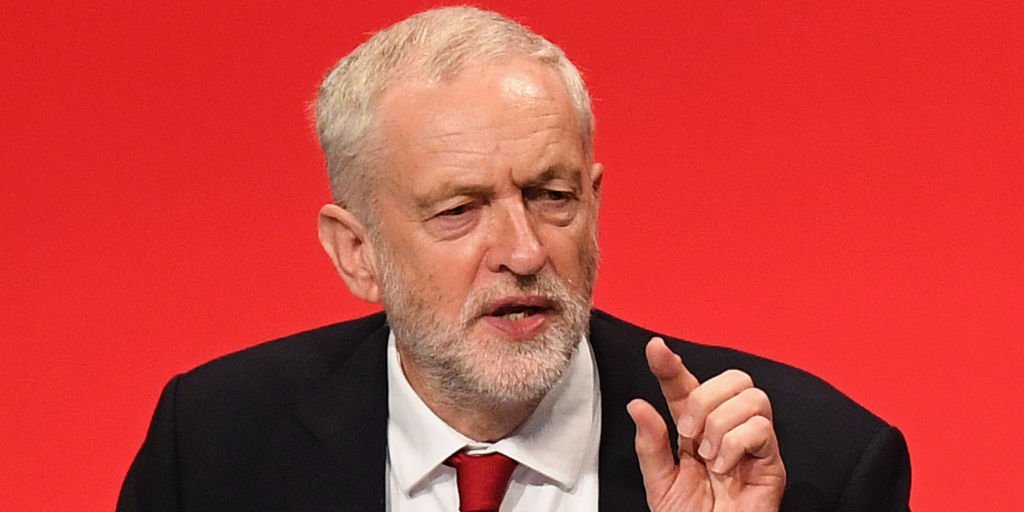 Leon Neal / Getty
Leon Neal / Getty
- A note from US bank Morgan Stanley was widely quoted as saying Jeremy Corbyn was a “bigger risk than Brexit” to the UK economy.
- Corbyn hit back calling banks like Morgan Stanley “speculators and gamblers who crashed our economy.”
- The bank’s words, however, have been taken hugely out of context, and refer merely to the UK stock market.
LONDON — This week an unusual fight developed in the UK. The participants: Labour leader Jeremy Corbyn, and strategists at banking giant Morgan Stanley.
In a note published on Sunday, a team from the bank led by equity strategist Graham Secker published their annual outlook for the European stock markets. The outlook totalled 73 pages, but two small sentences grabbed all the headlines.
On the surface, Secker and his team argued that a Corbyn government — now a very realistic possibility — would be “the most significant political shift in the UK” since Margaret Thatcher, and said it could be “a bigger risk than Brexit” to Britain’s slowing economy.
Corbyn was not pleased.
In a video posted on social media on Wednesday, Corbyn attacked the bank, and bankers in general. He criticised Morgan Stanley for its role in the 2008 financial crisis, labelling it as one of the “speculators and gamblers who crashed our economy”
“Their greed plunged the world into crisis and we’re still paying the price,” he said.
“Nurses, teachers, shopworkers, builders, just about everyone is finding it harder to get by, while Morgan Stanley’s CEO paid himself £21.5 million last year and UK banks paid out £15 billion in bonuses.”
The video struck a chord with Corbyn’s backers, gaining hundreds of thousands of views, likes and shares on Twitter and Facebook.
The success of the message makes sense. Much of Corbyn’s base support comes from those who feel disenfranchised and think bankers are actively trying to screw the little guy, so to see their leader attack those interests is a welcome sight.
In reality, Morgan Stanley’s comments were taken wholly out of context.
Most media articles covering the “bigger risk than Brexit” comments failed to acknowledge that Morgan Stanley’s team was not referring to the UK economy as a whole, but rather a very small segment of it — the stock market. In their true context, the quotes are far less bombastic.
Here’s the full pair of quotes, as they appeared in Morgan Stanley’s 2018 European Equity Outlook:
For the UK market, domestic politics may be perceived as a bigger risk than Brexit
From a UK investor perspective, we believe that the domestic political situation is at least as significant as Brexit, given the fragile state of the current Government and the perceived risks of an incoming Labour administration that could potentially embark on a radical change in policy direction. Against this backdrop, even if we see good progress in the Brexit negotiations, the scope for UK sensitive assets to rally may be muted, unless we also see an improvement in the government’s position in opinion polls.
UK politics could see its biggest shift since the late 1970s
For much of the past 30 years and more, a change of government ultimately had a relatively limited impact on the UK equity market,as policy settings didn’t change too dramatically. However, this may not be the case if we see a Labour government take power under its current leadership, given its very different policy approach. It is certainly plausible that the Labour Party could ultimately moderate some of its more radical policy ideas; the alternative could be the most significant political shift in the UK since the end of the 1970s.
Pretty innocuous, right? Morgan Stanley isn’t trying to suggest that a Corbyn government would totally crash the economy, but instead merely believes that investors — who by their nature do not really like the unknown — would be put off by a Labour government coming to power, leading to a substantial, but not catastrophic, stock market correction.
For Corbyn, it is a perfect political play. He almost certainly knows that Morgan Stanley was just talking about the stock market, but that doesn’t matter. Attacking the alleged vested interests of the banking sector is a perfect one-two punch that will enthuse and mobilise his core support, while also allowing him to play the victim and perfectly illustrate his —probably fair — belief that the establishment is running scared of the Labour Party in its current form.
We may yet find out whether Corbyn does cause the UK stock market to tank: Morgan Stanley itself believes that the UK is heading for a fresh general election next year.
Earlier this week, the bank’s British economics team of Jacob Nell and Melanie Baker wrote in their European Economic Outlook that the Conservative Party is “torn.” This disharmony will eventually lead to the government’s untimely demise, they believe.
“With a minority government torn over Europe and facing a divisive choice between ‘taking back control’ and maintaining close links, we see another early election as likely.”
Given that Corbyn effectively needs only 1,682 more votes in marginal constituencies to become prime minister, we might find out if Secker and his team’s misinterpreted forecast comes true sooner than later.













